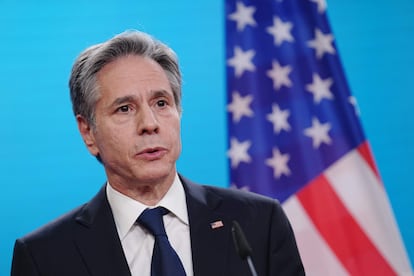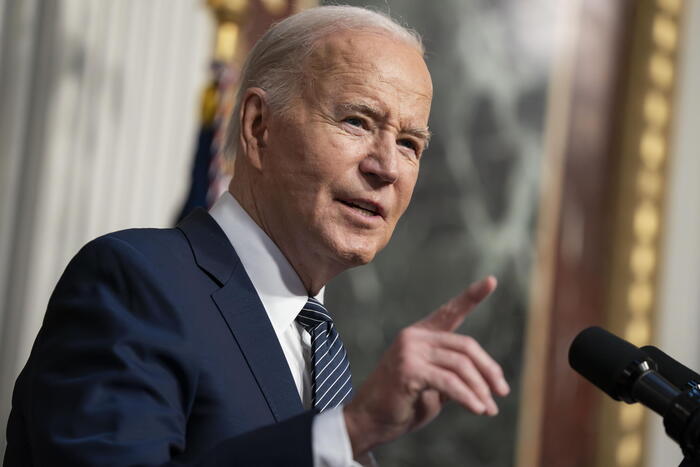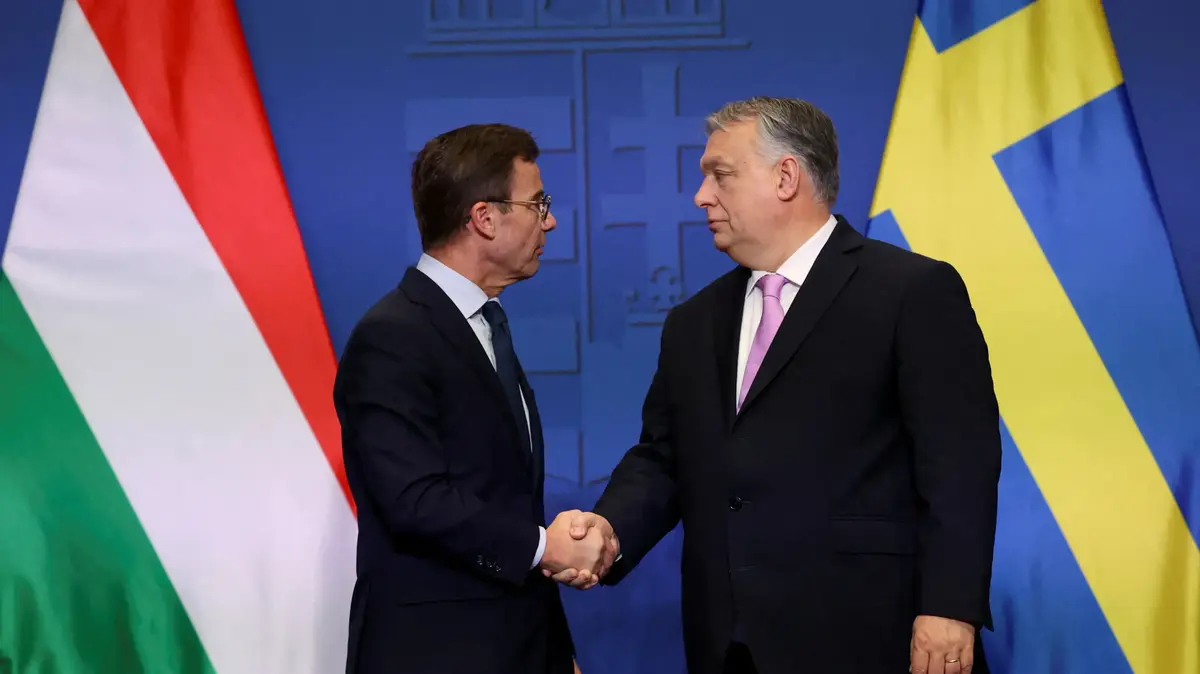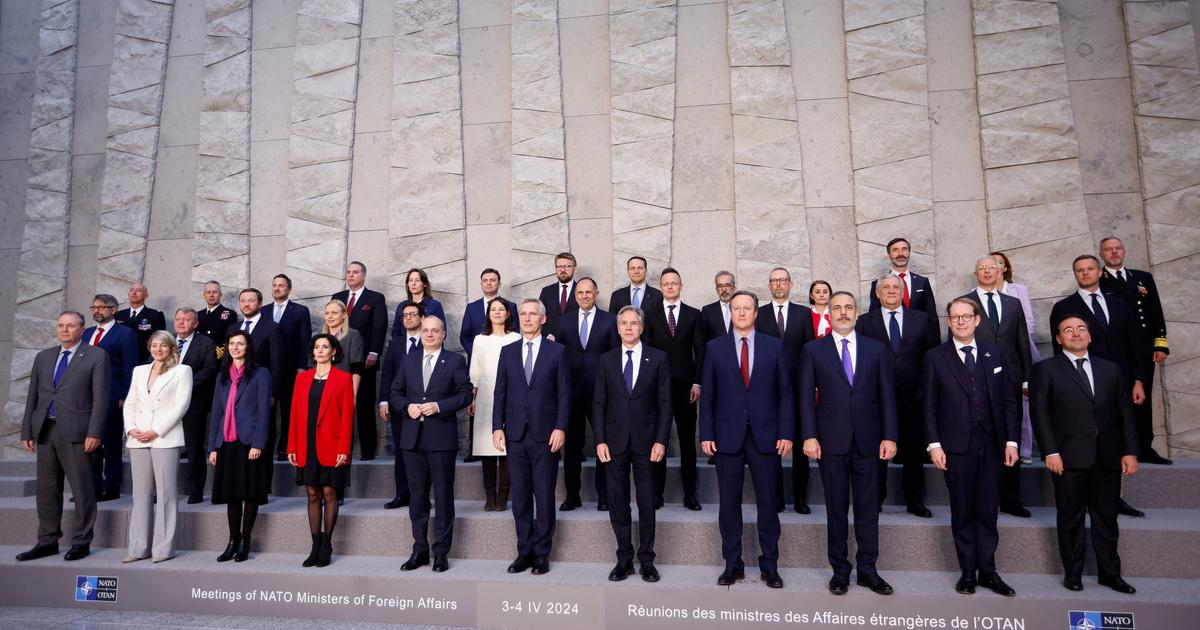US Secretary of State Antony Blinken in an image from January 23. KAY NIETFELD (AFP)
The security crisis in eastern Europe is entering a new phase after NATO and the United States slammed the door on Vladimir Putin's demands to curb the military activity of Western allies on the eastern flank of the Old Continent.
The secretary general of the Atlantic Alliance, Jens Stoltenberg, announced this Wednesday at a press conference that he had transmitted in writing to Moscow the refusal to sign an international agreement with Moscow that would limit NATO's expansion and capacity for action.
The US Secretary of State, Antony Blinken, also announced this Wednesday in Washington that his government has transferred to the Kremlin the response that it demanded in writing, which goes in the same direction as that of the allies.
Although he has not wanted to specify the content of the letter, he has pronounced some key words: "The door of NATO is still open", in reference to the possible entry of new members.
The rejection of Putin's demands opens the question of the Kremlin's reaction, with analysts divided on the imminence of a dazzling armed attack against Ukraine, a negotiation with an uncertain path or a latent conflict that could bleed the country under attack for years.
Moscow demands guarantees that NATO will not expand towards its borders, will not incorporate Ukraine and Georgia and, furthermore, will paralyze all military activity in Eastern Europe, Central Asia and the Caucasus.
The Atlantic Alliance does not have bases in Eastern Europe, but it does deploy multi-national battalions in rotations in Poland and the Baltic countries.
Stoltenberg has underlined that “each country is free to choose its path”.
And he has demanded that Russia not exercise any type of coercion on the States that aspire to join NATO and that it withdraw the troops deployed in Ukraine, Georgia and Moldvia without permission from the governments of those countries.
Blinken has opened the door, however, to some kind of negotiation.
In a very cryptic way, he has pointed out that the document identifies areas of "reciprocity" in which the parties can advance in common security.
At the beginning of the year, the Joe Biden Administration already sent signals that it was willing to negotiate with the Kremlin on issues such as the deployment of missiles and the scope of military maneuvers if it loosens the pressure on Ukraine.
Even so, the Secretary of State has stressed that the answer includes many of the ideas that have been repeated all these weeks.
That means that Putin's aspirations to contain NATO will not be fulfilled.
"We are facing a key moment for security in Europe," Stoltenberg said in a solemn tone.
The secretary general of the Alliance recalled that "there are more than 130,000 Russian troops along the Ukrainian border and more troops are arriving".
And he has added that there are also deployments of Russian forces in Belarus, the country dominated by Alexandr Lukashenko, whose fate depends on Russian President Vladimir Putin since the revolts against his dictatorship in 2020.
NATO's response to Moscow's demands offers certain areas for negotiation, above all, in relation to mutual arms control, the fluid exchange of information on military maneuvers to avoid incidents or the establishment of a kind of "hotline". ” as an emergency line in cases of maximum risk.
But none of these offers satisfies the demands made by Putin under threat of resorting to force to achieve his goals if NATO and the US do not accept them.
On December 17, Russia published a draft international treaty "On measures to ensure the security of the Russian Federation and NATO member states."
The text, of nine articles, proclaims that the signatories confirm that "they do not consider each other as adversaries."
And to underpin this peaceful coexistence, the Western allies would commit themselves by signing the Treaty “to avoid any further enlargement of NATO, including the accession of Ukraine or other States”;
not to deploy troops or weapons, without the prior consent of Moscow, in the countries that joined the Alliance after 1997, and not to carry out military maneuvers on the territory of Ukraine and other countries of Eastern Europe, the South Caucasus and Central Asia .
Allied sources showed from the first moment their astonishment at some proposals that they described as “inadmissible”.
And for weeks, the Alliance refused to officially respond to some proposals that sounded in Brussels like a provocation or a mere excuse to justify a future military aggression against Ukraine.
Both the US and NATO have finally decided to respond in writing, as a way to maintain the search for a negotiated solution to the biggest security crisis in Europe since the end of the cold war.
Stoltenberg has pointed out the need to seek a solution "through diplomatic channels, not resorting to force or the threat of using force."
And he has demanded that Russia take steps "to de-escalate the situation."
Stoltenberg stressed that NATO "is a defensive alliance, we are not looking for confrontation."
But he has warned that article 5 of the organization provides for collective defense to ensure the safety of any ally who is attacked.
That article does not cover Ukraine, which is not part of the Alliance, but it does cover allies that feel threatened by Russia or Belarus, such as Lithuania or Poland.
Follow all the international information on
and
, or in
our weekly newsletter
.








